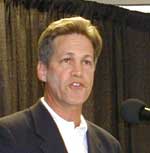The 'Norm' Factor
By William Wilcoxen, Minnesota Public Radio
September 7, 2001
Norm Coleman is not seeking a third term as mayor of St. Paul, but his imprint is visible on this year's race. The relationships of the major mayoral candidates to Coleman and his legacy are among the political angles at play in Tuesday's mayoral primary.
| |
|
|
|
||
"Most people think St. Paul is better today than it was eight years ago," Kelly said recently. "I tend to think that most people credit Norm Coleman as being the quarterback in that effort. I've played on that team and worked shoulder to shoulder with Norm to make sure that we move this city forward."
Kelly helped gain state funding for some of the building projects Coleman championed. Their mutual admiration was undiminished by Coleman's switch from the DFL to the Republican Party late in his first term. This year's DFL-endorsed candidate, Jay Benanav, sits on the City Council, where he's had some disagreements with Coleman. But Benanav says Coleman shouldn't be a central figure in this year's race. "This isn't a referendum on Norm Coleman. This isn't a referendum on what's been done. This election is about the next four years. So the issue that the voters ought to pay attention to is what are the priorities that each of us is espousing. This is talking about the future, not about the past, " according to Benanav.
St. Paul has a solid DFL reputation. But Republican activists say the party has new life in the city following Coleman's switch. This summer, City Council member Jerry Blakey made the same change, gaining the Republican endorsement after failing to get the DFL nod. But Coleman is not backing his party's new candidate, having thrown his support to Kelly before Blakey's switch.
Blakey says it remains to be seen how his change of parties will affect his mayoral fortunes. "I have people that have supported me all along, who say 'I'm with you no matter what.' There's been some people who say 'I can't vote Republican.' There are some who say 'Well, I might have to hold my nose.' People have their perceptions but I'm the same Jerry Blakey I've always been in that regard," he says.
| |
|
|
|
The candidates who were endorsed lost badly to Coleman. This time both Long and Megard decided to run in the primary even without party endorsement. Megard says the criteria party delegates use to make an endorsement are not the same as those typical voters use. "People are going to look for the person who has the ability to lead this city. And that's not something the party process is really involved in," she says.
The readiness of DFLers to challenge the endorsed candidate has raised questions about whether the party is fading. Jay Benanav sees little change. He says Democrats have always enjoyed a good political fight. Bob Long thinks the party should change its endorsement process to support multiple candidates. "What Minnesota has to do is do what Colorado has done and find a way to happily marry party politics and conventions and caucuses with primaries," Long says. "Because primaries are here to stay and we need to find a way to encourage political party participation but not make an exclusive winner take all system that can keep other good candidates out of a primary."
No party affiliation appears on the ballot in St Paul's non-partisan mayoral primary. That suits Bob Kessler, who has no party affiliation. Kessler has been a city employee under each of the last three mayors. He says on the campaign trail citizens seem to respond well to his independent status. "Now, whether or not they will vote is the other question in a primary," Kessler acknowledges. "And it's going to be a low turnout primary. The other thing is we don't have a list of Independents we can call because they're too independent."
Most turnout estimates hover around 32,000. The two candidates who gain the most votes will move on the November 6th general election.

